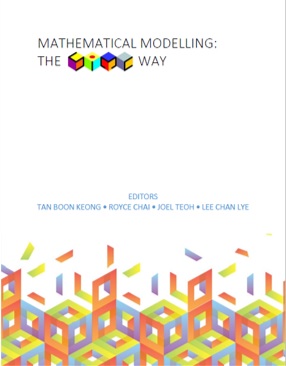West Zone COE for Math
Background
NUS High School of Math and Science became a Centre of Excellence for Math in 2012. The centre seeks to promote the interest and passion of students towards Math, as well as facilitate the professional development of teachers with regard to Math pedagogy and content, so that teachers can attain growth towards expertise, thereby benefiting the students in all schools in the West Zone. The centre also hopes to foster collaboration among Math teachers in the West Zone so as to make teachers’ learning more effective via shared knowledge.
Events in 2019
From 2019, we were tasked to focus on the professional development of primary school mathematics teachers. A pilot Networked Learning Community (NLC) of 30 teachers from 17 WZ primary schools was formed to try out Model-Eliciting Activities (MEA) to expose their students to the process of mathematical modelling. This NLC was facilitated by Ms Theresa Heng (MTT / AST) and her team in 3 sessions held on 11 Apr, 18 Jul and 19 Sep. The NLC will continue to work on MEA for 2020.
A sharing session of the Talent Development Programme in NUS High School was held on 25 July 2019. The sharing provided insights into how NUS High develops and realises a child’s full potential especially in mathematics and science through its structures and processes. The principles in the design of this programme will be useful for primary school educators who are interested in exploring strategies for high ability students to thrive and blossom into talents.
For enquiries, email us at euler@highschool.nus.edu.sg
Past Events
Since 2008, NUS High School and CPDD, MOE co-organised the biennial Singapore International Mathematics Challenge (SIMC), a mathematics modelling competition for high school students around the world. Mathematics educators networked and learned from one another through an educators’ programme held concurrently with SIMC. A compilation of the ideas shared over the years was published in a 2018 book titled Mathematical Modelling: The SIMC Way.

In addition, over the past 7 years, the West Zone Centre of Excellence for Math has organised several workshops, along the following 3 themes:
Content Upgrading
1. Developing Geometric Thinking in Secondary School Students
Participants learnt alternative ways to teach similar and congruent triangles so as to deepen students understanding of geometry.
2. Reasoning and Problem Solving in Geometry
Participants learnt how to teach for deeper understanding in Circle Geometry, especially results that students find difficult (such as the tangent-secant theorem).
3. How to Generate Math Problems for Investigation
Participants learnt how to generate Math problems from routine problems so that they are suitable to be used for investigation.
4. Supervising Investigative Project Work in Mathematics
Participants learnt how to supervise and guide students in investigative project work.
5. An Insight into Math Olympiad Problems
Participants picked up insights on how to solve Math Olympiad problems. These translate into basic skills that they could focus on when training their students.
Pedagogy
1. Using Dynamic images to enhance Mathematics teaching
Participants learnt from Professor Douglas Butler how to use the Autograph software to enhance their teaching.
2. Scaffolding to Strengthen Conceptual Understanding
Participants learnt how to scaffold mathematical tasks to strengthen students’ conceptual understanding.
3. Flipped Classrooms
Participants learnt about NUS High’s journey in using flipped classrooms as a pedagogy to teach mathematics in a secondary context. The same approach was also implemented for selected primary school students in NUS High’s talent development programme. A tour of the ‘LightBoard’ recording lab was part of the workshop experience.
4. Using Contrasting Examples to Support Procedural Flexibility in Math through Reasoning
Participants learnt how to design learning tasks with contrasting examples to promote students’ flexible thinking and to enhance their reasoning skills through teacher-facilitated classroom discourse. These contrasting examples emphasized an action-reflection loop, making students aware that reasoning and communication are important for deepening conceptual understanding.
5. Using Online GC and Geogebra for Teaching and Learning
Participants learnt how to use Desmos, an online Graphing Calculator, and Geogebra. These software are great for teaching and learning of Calculus and graph-related topics as they are good visualization tools. No software installation is required to use Desmos and students can pick up the syntax easily as it is user-friendly. Via their smartphones, students can also learn on the go through the DESMOS mobile app.
6. Problems in Real-World Context (PRWC)
Participants learnt how to teach PRWC to students via a metacognitive approach of using Comprehension, Strategic and Connection questions. They also benefited from the sharing of past exam questions among the schools represented to form a pool of PRWC resources for teachers’ use. This workshop was conducted by a group of Lead and Senior Teachers from the WZCOE Secondary Mathematics Networked Learning Community.
7. Mathematics Masterclass for Primary School Teachers
Participants attended a masterclass by master teachers from Hungary, where they learnt about the experiential learning approach to teach the concepts of divisibility and prime number factorisation through several hands-on activities.
Assessment
1. How to Mark Hard Questions
Participants learnt from Professor Imre Leader, Fellow at Trinity College, Cambridge University, how to give useful feedback to students when giving them hard questions to solve.
2. Analysis & Insights of Assessment Results
Participants learnt to use analytical methods like facility and discrimination indices to review assessment results. Further diagnostic information were garnered by evaluating the data against the table of specifications.

